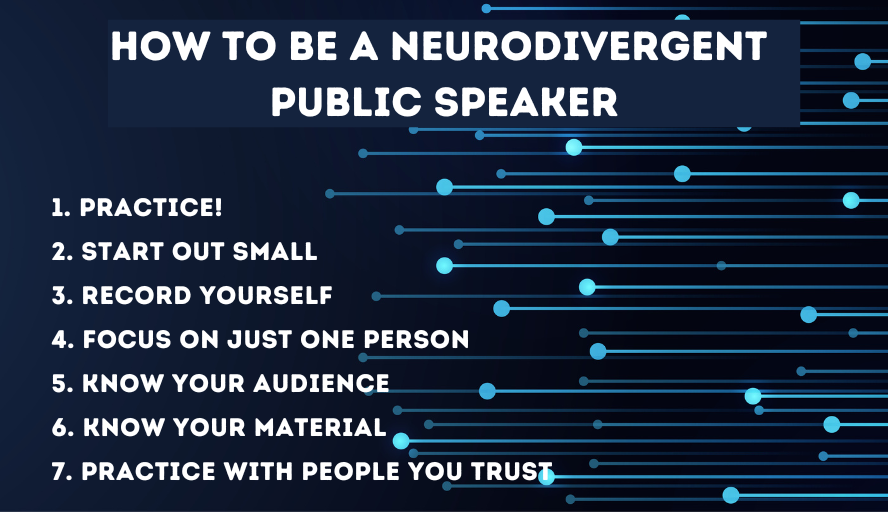How to Be a Neurodivergent Public Speaker

Let’s talk about neurodivergence.
Writing for Verywell Mind, Ariane Resnick, CNC, explains, “Neurodivergence is the term for when someone's brain processes, learns, and/or behaves differently from what is considered ‘typical’.”
For our purposes, neurodivergent public speakers are those who struggle with conditions such as autism and Asperger’s Syndrome, as well as those who have severe anxiety disorders and other mental health conditions.
So the big question is whether it’s still possible for neurodivergent people to become great public speakers. The answer to that is a resounding “yes.”
The even bigger question is “how” and that’s what we’re looking at today. Here’s what you need to know if you want to be a successful neurodivergent public speaker.

1. Practice!
This tip isn’t unique to neurodivergent public speakers, but that doesn’t make it any less important.
They say that practice makes perfect, which is true. The more we practice, the better we become as public speakers, in part because we start to pick up on problems and figure out ways to deal with them.
This is useful for neurodivergent people because they face a unique set of challenges that most other people don’t have to worry about. Sometimes, the only way to discover those challenges is through practice.
And so if you only take one thing away from this article, it’s this—if you want to get good, you need to practice.
2. Start out small
One of the best things you can do as a neurodivergent public speaker is to start out small and scale things up. That means doing your first couple of public speaking engagements in front of smaller audiences or in situations where the stakes are low.
Instead of speaking at a huge conference, talk at a show and tell. Picture yourself as a musician trying out material at an open mic night before they hit the big time.
Remember that it’s better to start small and scale up than to shoot too high and end up crashing and burning.
3. Record yourself
If you record yourself delivering your presentation, you can play it back and look for any mistakes you may be making.
For example, if you keep saying “umm” or you find yourself speaking too quickly as you cover the key points that you want to share, you can ensure that you don’t do it again in the future.
This is another trick that works well for all public speakers, but it works better for neurodivergent speakers. They’re most likely to have something unexpected come up that a recording will help reveal.
4. Focus on just one person
When it’s time for you to deliver your presentation in person, it can help to focus on a single person in the audience.
It’s easy for neurodivergent people to feel overwhelmed when facing a large group of people, so focusing on a single person can help them control that overwhelm and make it feel more like a one-on-one meeting.
This is another one of those tips that can be used by anyone, but neurodivergent people have the most to gain from putting it to use. And as a bonus, it will make your presentations flow more smoothly, too.
5. Know your audience
Knowing your audience helps ensure you’re delivering the presentation they need to hear.
This is important because it’s easy for us to get caught up in our favorite subjects. We talk about what we want to talk about rather than what we need to. It’s an easy mistake to make, especially for someone who’s neurodivergent.
Don’t make the mistake of leaving this step until the last minute. Knowing your audience allows you to build your presentation with that audience in mind, from the subjects you talk about to the message you deliver.
But knowing your audience is only half the battle. There’s something else you need to know.
6. Know your material
If you know your material well, it doesn’t matter whether you’re neurodivergent or not.
That’s because your material is at the heart of what you’re going to talk about. So if you know it well, then you’ve got everything you need to deliver a killer presentation.
You should also bear in mind that there’s usually time at the end of presentations for people to ask questions. Neurodivergent people can struggle with this because it’s an aspect of the presentation that they can’t control.
Luckily, the more you know your material, the easier it is to answer those questions.
7. Practice with people you trust
Neurodivergence shouldn’t be seen as a weakness, but it happens.
When that’s the case, neurodivergent public speakers can feel ashamed or embarrassed, and that can lead to them feeling as though they have to tackle everything themselves. That’s just not true.
That’s also why it’s important for public speakers with neurodivergence to find someone they trust and to ask them for help. Ideally, they’ll sit there and listen to your presentation and give you notes on how you can improve your delivery.
Conclusion
Being neurodivergent doesn’t mean you can’t be a decent public speaker, and you shouldn’t see it as something that will hold you back. It’s just something that you need to bear in mind so that you can adapt your approach.
There are plenty of neurodivergent public speakers out there, and you might be surprised by how prevalent it is on the circuit. You should also remember that neurodivergence comes on a sliding scale, so some speakers struggle more with it than others.
Either way, the tips we have shared today should be enough to help you make the most of your public speaking career.
Now that you’ve heard from us, we’d love to hear from you. What tips have helped you as a neurodivergent public speaker, and is there anything you think we’ve missed?
As always, be sure to let us know your thoughts in the comments so we can keep the discussion going. You can also follow us on your favorite social networking sites for more.
We’ll see you soon for another article!




